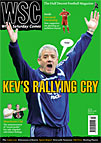 Graham Dunbar reports on the formation of the European Club Association
Graham Dunbar reports on the formation of the European Club Association
Eight years after its creation, the G-14 is dead: long live the European Club Association. It was created at UEFA headquarters in January and hailed by its elected chairman, Karl-Heinz Rummenigge of Bayern Munich, as nothing less than the “reunification of the football family”.
The leaders of the new ECA are largely the same people who were the power‑brokers behind the old G-14, though to a man they hailed this realignment as a glorious triumph for Michel Platini in the week he celebrated the end of his first year as UEFA president. Why, then, did he seem so determined to brush aside the gushing tributes, and choose the word “logical” over historic to describe his great achievement? Perhaps because he realises that while Brussels-based G-14 is dead, its agenda and supporters have succeeded in a power struggle that has rather put the European and world governing bodies in their place. The threat of potentially ruinous legal action can do that, as the Bosman ruling showed.
Those three new cases against FIFA – brought by Charleroi, Lyon and Atlético Madrid, backed by G-14 and now dropped – demanded compensation to pay the wages of players injured while on international duty. The payback is that UEFA will give clubs €4,000 (about £3,000) for each day a player is involved in the European Championship; FIFA will spread £56m over the next two World Cups. If the semi-final line-up in Austria and Switzerland this summer is a repeat of the 2006 World Cup last four – Italy, Germany, France and Portugal – then Michel will probably be signing the biggest cheques to Bayern Munich, Barcelona, Lyon and Chelsea. All four of these clubs are represented on the six-man transitional board of the ECA.
Certainly the clubs have been rewarded for ruthless corporate negotiating tactics, yet the ECA does promise a more peaceful and democratic future. While G-14 was a self-selecting cabal of elite, rich clubs and in the end had 18 members drawn from only seven nations, its replacement will have at least one club from each of the 53 national associations that make up UEFA and will comprise 103 clubs. (That’s the same number as were in the also-disbanded European Club Forum, which foreshadowed the ECA but was so irrelevant it gave seats to Newcastle United and Hearts.)
And to see the launch being proclaimed by Platini and Rummenigge surely warms the hearts of fans of a certain age, for whom the two men are bound up in so many memories of international and club classic matches in the ten or so years around 1980. Just to make sure, Platini stressed that the game is now run by a new generation of leaders drawn not from politics – that means you, Lennart and Sepp – but football, and who thus understand clubs’ needs.
Platini’s gift for understanding also stretched to promising talks to move the Africa Cup of Nations to a more Europe-friendly summer slot by 2016, and playing internationals on Tuesdays to send players back to their clubs a day earlier.
The day also ordained Peter Kenyon, the Chelsea chief executive, as the kingpin of English football, a role David Dein (remember him?) seemed to fill during G‑14’s heyday. While Kenyon took Manchester United into G-14, he kept Chelsea out and – on a day when Liverpool’s Rick Parry was detained by the growing crisis at home and United’s David Gill was in Saudi Arabia – has moved smoothly into Platini’s inner circle.
By offering the ECA office space just down the corridor, Platini at least ensures the power-brokers will have to do any future pissing from inside the Nyon tent.
From WSC 253 March 2008